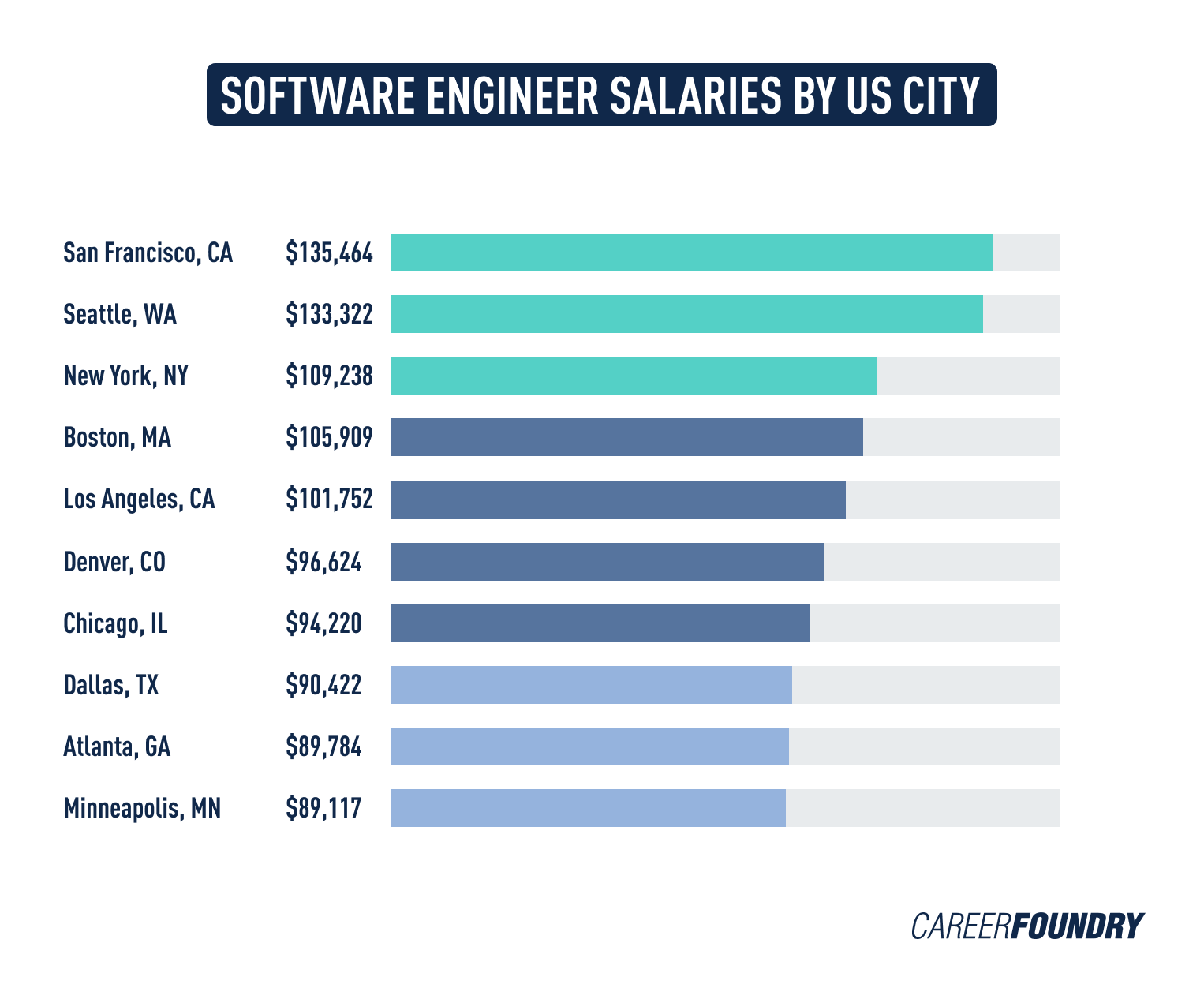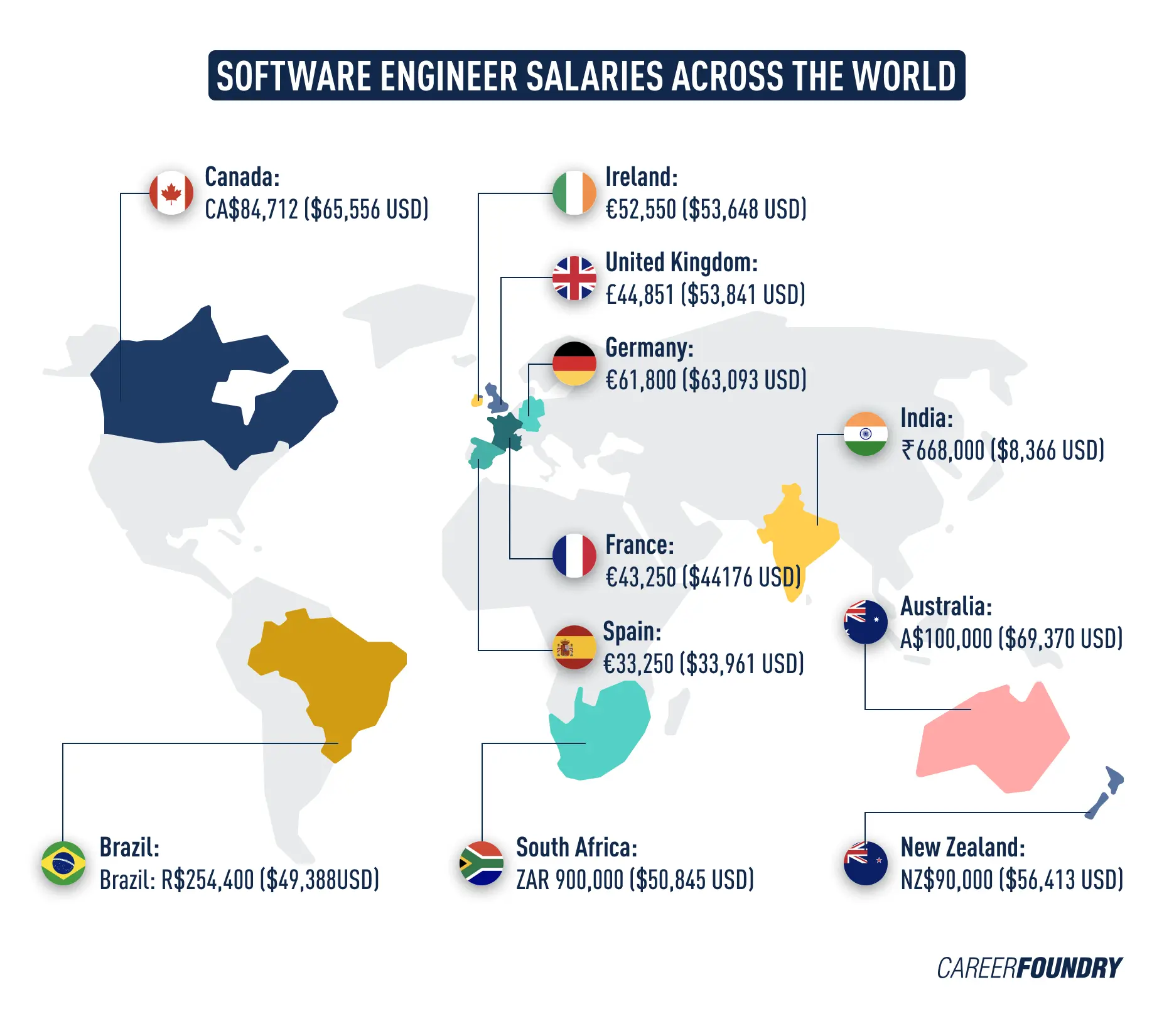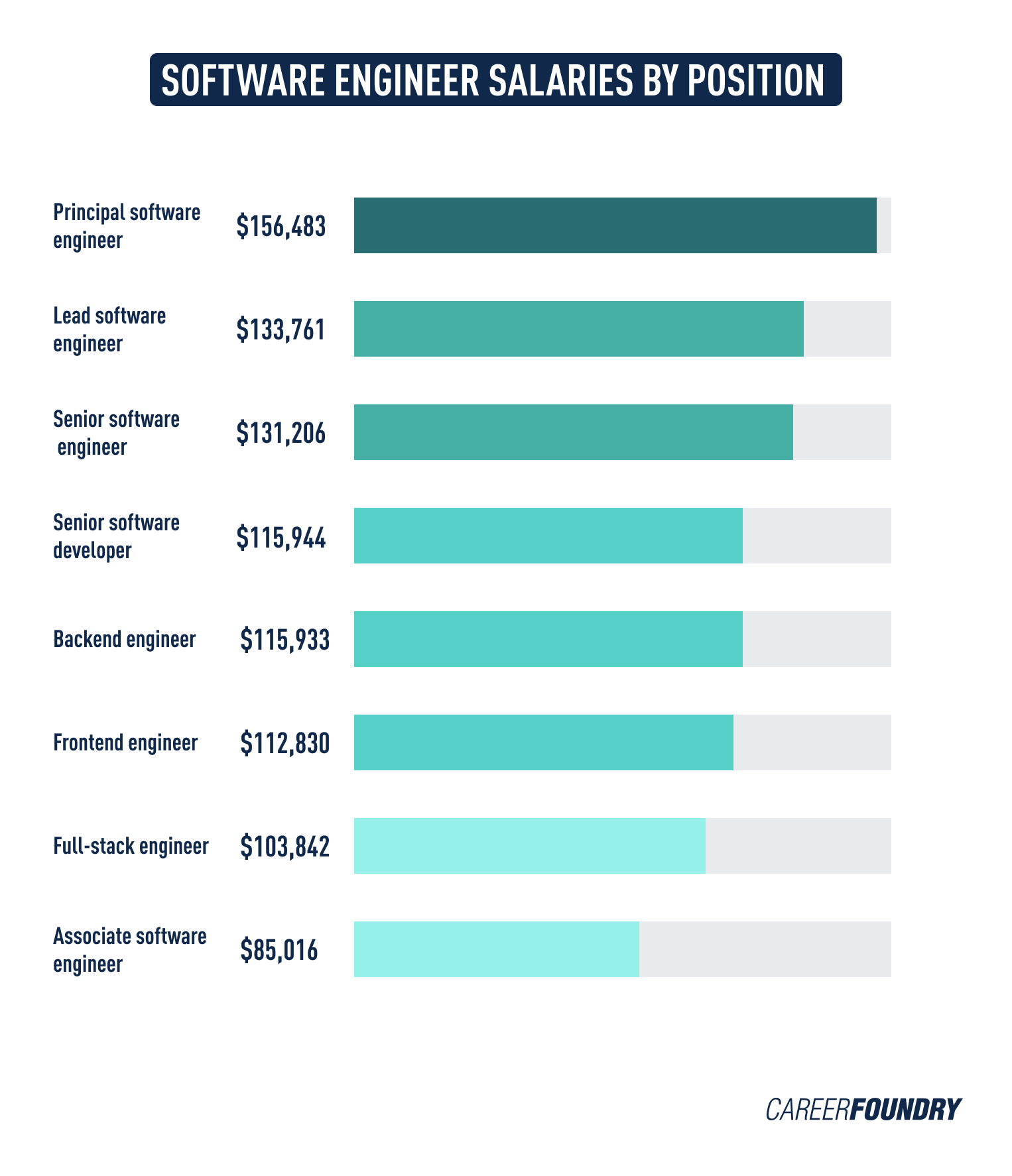So, you’re considering a career as a software engineer. Great!
Naturally, you’ll have some questions: How do I become a software engineer? Are they in demand? And, crucially, how much money can I actually make?
But with so much information out there, it’s hard to get consistent facts around things like the average software engineer salary—or how saturated the job market is today.
We’re here to help!
In this practical guide, we’ll drop the jargon and clearly explain everything you need to know about becoming a software engineer. That way, you can make an informed decision about whether it’s the right career path for you.
Here are the sections we’ll explore. Feel free to skip ahead if you’re looking for a specific answer:
- What is a software engineer?
- How much can I earn as a software engineer?
- What’s the difference between a software engineer and a developer?
- Are software engineers in demand?
- How to get started in software engineering
- Wrap-up
1. What is a software engineer?
Before we dive into software engineer salaries, what exactly do software engineers do— and what does the role entail?
Software engineering, also known as software development, is a sub-discipline of computer science that involves developing computer software.
Software engineers build, test, and develop programs for computer systems; as well as web applications, operating systems, hardware, computer games, and network control systems. To build the software, software engineers typically write code in software engineering languages like Python, Java, and C++.
What software engineers work on in their day-to-day can depend massively depending on the sector they’re in, whether they’re frontend or backend, and their level of experience. Common software engineer responsibilities include:
- Identifying and fixing bugs
- Revising programs
- Build operating systems
- Releasing updates
- Writing and testing code
- Optimizing software for usability
- Liaising with key stakeholders
- Creating and enforcing IT standards
- Enforcing and upholding engineering principles
While these are just a few examples, the software engineering field is broad. There are many different types of programmers, some with specific skillsets.
We’ll explore the average software engineer salary for these alternative job titles further along in the next section.
2. How much can I earn as a software engineer?
Now that we’ve established what a software engineer actually does, and the likelihood of finding a software engineering job, let’s dive into how much you could earn in the profession.
To keep things consistent, we’ve pulled 2025 salary data from Glassdoor and presented it in United States Dollars (USD). If you don’t see your country or city listed here, we recommend using Glassdoor, Indeed, or Payscale to search average software engineer salaries in your area.
What is the average software engineer salary in the United States?
As we said earlier, the average software engineer based in the United States earns $139,702 a year. That’s over double the average national salary of $53,490, according to Jobted.
Here’s a rundown of software engineer salaries, broken down by U.S. city:

- San Francisco, CA: $171,000
- New York, NY: $155,000
- Seattle, WA: $157,000
- Los Angeles, CA: $147,000
- Chicago, IL: $123,000
- Denver, CO: $127,000
- Minneapolis, MN: $124,000
- Atlanta, GA: $122,000
- Boston, MA: $144,000
- Dallas, TX: $123,000
How much do software engineers earn around the world?
As with any profession, your earning potential as a software engineer can vary depending on your location.
We’ve established that software engineers are in high demand in the United States, but is it still a lucrative career path around the rest of the world?
Let’s take a look at how much you can earn as a software engineer outside of the U.S.:

- UK: £52,000 ($68,000 USD)
- Ireland: €62,000 ($70,000 USD)
- Germany: €65,000 ($75,000 USD) We’ve created a software engineer salary guide for Germany with more detail
- France: €49,000 ($54,000 USD)
- Spain: €38,000 ($39,000 USD)
- Italy: €34,000 ($36,000 USD)
- Australia: AUD$120,000 ($82,000 USD)
- New Zealand: NZ$100,000 ($63,000 USD)
- India: ₹900,000 ($10,366 USD)
- Brazil: R$226,000 ($48,000 USD)
- Nigeria: NGN 5,760,000 ($7,000 USD)
- Canada: CAD$98,000 ($75,000 USD)
- South Africa: ZAR 792,000 ($47,000 USD)
Software engineer salary based on position
As we explored in previous sections, software engineering isn’t just one discipline: There are a multitude of specialist roles relating to it that you could segue into.
So, what’s the earning potential behind some of the other key software engineering jobs?

- Associate software engineer: $114,000
- Frontend engineer: $128,000
- Backend engineer: $140,000
- Full-stack engineer: $137,000
- Senior software engineer: $193,000
- Senior software developer: $183,000
- Lead software engineer: $218,000
- Principal software engineer: $264,000
Software engineer salary by company
If you’re considering a career in software engineering, you might already have your eye on a company that already has an established software engineering function.
The kind of company where you’ll have the opportunity to work on exciting, innovative projects. Although most big tech giants pay above average, it’s important to get an overview of how software engineering salaries can vary depending on the company.
Here are some average software engineering salaries at nine of the world’s top tech companies:
- Google: US$251,000
- Meta: $263,000
- Apple: $247,129
- Amazon: $188,000
- Microsoft: $197,000
- NVIDIA: $221,000
- Uber: $198,000
- LinkedIn: $214,000
- Yahoo: $142,000
3. What’s the difference between a software engineer and a developer?
You might have read the previous section and wondered whether software engineer is just another term for web developer.
In reality, the two disciplines share more similarities than differences—and the job titles are often used interchangeably.
The most notable difference between software engineering and web development is in how much they can earn.
According to Glassdoor, a software engineer salary comes in at an average of $139,000 in the United States; while web developers earn a lower average salary of $89,000.
One reason for this is the scope of software engineering work.
Many software engineers work more closely with hardware, or on a larger variety of computer systems and IT programs; whereas web developers tend to work primarily on desktop programs and web experiences.
To understand both job specs in more detail, we recommend reading our practical guide to the differences between a software engineer and a web developer.

4. Are software engineers in demand?
Any career change involves a hefty degree of sacrifice and commitment—so it’s only fair that you want to make sure the career path you’re transitioning into has longevity.
So, are software engineers actually in demand?
The short answer is yes. In fact, software engineering is the world’s most in-demand profession, according to recent analysis by specialist recruitment company Michael Page.
If that wasn’t compelling enough, the demand for software developers is only set to grow.
According to the U.S. Bureau of Labor Statistics, the demand for software engineers and developers will increase by 25% between 2022 and 2032 (that’s 20% more than the growth of average occupations). The bureau also predicted that there will be around 189,200 job openings for software engineers every year.
As the field of software engineering develops, there’ll also be a growing demand for specialists; and plenty of opportunities to add specific skills and qualifications to your toolkit in order to stay competitive.
5. How to get started in software engineering
Now you know that software engineering is a lucrative career path—and it’s not going anywhere anytime soon. All that’s left to do is get started!
Despite how technical the field is, you don’t actually need pre-learned coding skills or a technical background to break into software engineering. All you really need is the time to learn the relevant skills, a computer which can support the software programs you build, and the motivation to make the switch.
Before you make any significant financial commitments in the form of a software engineering course or bootcamp, you first need to dip your toes into the field to understand whether or not it’s right for you.
In addition to reading blogs and career change stories, you can also try a free coding class. This will allow you to get stuck in with coding, as well as learning fundamental software principles.
Once you’ve established you actually enjoy the discipline, you have a few options: You can either teach yourself how to code through books, apps, and tutorials; or enroll in a career-change program.
Opting for one of these will see you gain the hard and soft skills employers look for, and take you from complete beginner to job-ready developer in less than a year—with a software engineer salary to match.
You’ll even walk away with a professional portfolio, ready to fire off to recruiters.
Wrap-up
Hopefully, this run-through of the average software engineer salary has helped you overcome any doubts about it being a worthy career path.
Not only is software engineering financially rewarding—you’ll also find yourself constantly innovating as technology continues to evolve.
The demand for software engineers will continue to grow across countries, sectors, and companies; so if you’ve been considering making the switch, there’s truly never been a better time.
Keen to learn more? Check out these related articles:
